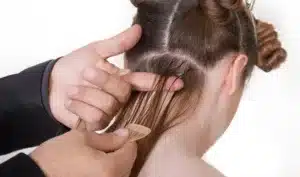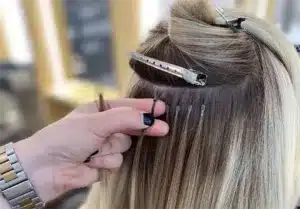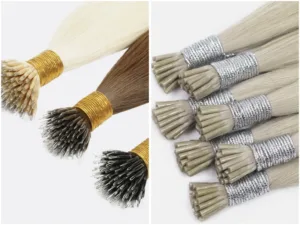Beaded weft extensions have become a go-to for stylists looking to add length and volume with minimal damage. But like any technique, they come with their own set of pros and cons. Let’s dive into the details so you can decide if they’re the right fit for your clients.
Beaded weft hair extensions offer a long-lasting, no-glue, no-heat solution to add fullness and length. They’re ideal for clients who want seamless results. However, the placement requires skill, and there’s a risk of discomfort if not installed properly. Here’s a closer look at the pros and cons.
Ready to weigh the pros and cons of beaded weft extensions in your salon? Stick with me for a thorough breakdown, from application to maintenance, so you can offer the best advice to your clients.

Pros of Beaded Weft Hair Extensions
Let’s kick things off with the positives, because who doesn’t love a good win? Beaded wefts are a game-changer for many stylists and clients alike. Here are the standout benefits:
1. Minimal Damage to Natural Hair
Unlike glue-based extensions or sew-ins, beaded wefts don’t cause stress on the natural hair. The beads hold the hair extensions in place without any harsh adhesives or sewing through the client’s hair. If applied correctly, this reduces the risk of hair breakage, making it a popular choice for those looking for a gentler option.
2. Long-Lasting Results
When installed properly, beaded wefts can last 6-8 weeks before needing maintenance. This is a huge plus for clients who want a low-maintenance hair extension option without the need for frequent touch-ups.
3. Customizable Volume and Length
Beaded wefts come in various widths and lengths, making them ideal for clients who need more volume, length, or both. You can easily blend them with natural hair, tailoring the look to suit different styles or client preferences.
4. No Heat or Glue Required
The installation process is heat-free, which is great for clients who are wary of heat damage. It’s also a no-glue method, which means there’s no mess and no damage from removal, unlike tape-ins or keratin-based extensions.
5. Natural Look and Feel
When applied correctly, beaded wefts blend seamlessly with natural hair, offering a smooth, undetectable finish. The weft lays flat against the scalp, providing a natural appearance that clients will love.

Cons of Beaded Weft Hair Extensions
Now, let’s talk about the downsides. As with anything, beaded wefts have their challenges, and it’s important to understand these before committing to the technique.
1. Skill-Dependent Installation
The installation process for beaded wefts requires a high level of skill. If the beads are too tight or not placed correctly, it can cause discomfort, and the extensions may not last as long. It’s essential to ensure that the stylist has adequate training and experience to achieve a perfect placement.
2. Potential Discomfort
While beaded wefts are generally comfortable, if they are installed too close to the scalp or too tightly, they can cause tension or itching. This is especially an issue for clients with sensitive scalps or fine hair. A skilled stylist will know how to avoid this, but it’s something to be mindful of during both application and aftercare.
3. Maintenance Requirements
Like all hair extensions, beaded wefts require regular maintenance. Clients will need to return every 6–8 weeks for repositioning as their natural hair grows. While this isn’t a major downside, it’s something to consider for clients who aren’t keen on frequent salon visits.
4. Risk of Slippage
If the beads aren’t crimped securely, or if the natural hair becomes too oily or weighed down, there’s a chance the extensions could slip. This is particularly a concern for clients with very fine hair, who may need additional support or different bead types.
5. Not Ideal for All Hair Types
Beaded wefts work best for medium to thick hair. For clients with very fine or thin hair, the beads may not hold as securely, and the extensions could appear bulky or not blend as seamlessly. It’s important to assess the client’s hair type before recommending this method.

Should You Offer Beaded Wefts in Your Salon?
Beaded wefts are a fantastic option for many clients, offering a natural look and long-lasting results without causing damage to the natural hair. However, as with any technique, they require skill and attention to detail during both installation and maintenance. Be sure to educate your clients on the pros and cons, and offer them a personalized consultation to determine if beaded wefts are the best fit for their hair type and lifestyle.

Conclusion
Beaded wefts are an excellent extension choice for clients looking for a seamless, damage-free method that provides volume and length. While they come with their own set of challenges—like the need for precise application and regular maintenance—they offer great results when done right. Consider all factors, including your client’s hair type and desired look, to determine whether beaded wefts are a good fit for their needs.
Hibiscus Hair Manufacturer has been dedicated to producing high-quality beaded weft hair extensions for 25 years and is a recognized leader in the industry. If you are interested in finding a reliable hair extensions supplier and wholesale for your brand, please visit our website for more information:
HAIR WEFT




